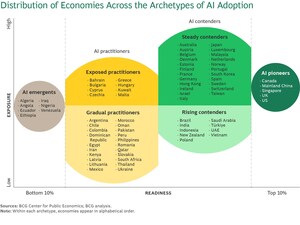BCG's Digital Acceleration Index (DAI) Study Finds That Digitally Mature Companies Saw Valuations of 23%, on Average, Above Precrisis Levels Within Six Months of the Pandemic's Start
- The Digital Acceleration Index (DAI) study found that digitally mature companies outperformed their peers across nine performance indicators, including revenue growth and enterprise value.
- Digitally mature (bionic) companies grew despite pandemic headwinds; they saw less of a decline in market capitalization at the start of the pandemic than did their less digitally mature peers, and then recovered faster.
- The hallmarks of successful, bionic companies across regions include investing significantly in technology, data, and human capabilities; putting AI at the core of the digital transformation; establishing governance and adopting a platform operating model; and connecting technology and human capabilities.
- In the US, the most digitally mature industries are financial institutions, technology, and telecommunications, while energy, media and entertainment, and the public sector are the least digitally mature.
- While US companies lag Asian companies in terms of digital maturity, the DAI scores of US companies are similar to those of companies in Europe.
NEW YORK, June 21, 2021 /PRNewswire/ -- Today, Boston Consulting Group (BCG) announced findings from its latest Digital Acceleration Index (DAI) study, which assesses the digital maturity of both companies and industries. The study revealed that despite major declines at the start of the pandemic, companies deemed the most digitally mature saw valuations 23% above precrisis levels, on average, within six months of the pandemic's start. These results contrast with the growth of the least digitally mature companies, which saw an increase of only 7%, on average.
The study included about 2,300 companies globally across ten industries. The DAI study found that the most digitally mature companies outperformed peers across nine performance indicators, including revenue growth, enterprise value, and the return on investment of digital projects. For these companies, the study found their strength comes from operating as a bionic company, meaning that they blend new technologies with human capabilities. In addition, bionic companies have a capability that we call human-tech augmentation—employees naturally and continually look for ways to integrate technology and data into their day-to-day work.
"The DAI helps companies assess their place on the digital maturity curve and build a roadmap for maximizing the potential of pairing humans and technology," stated Michael Urban, the DAI lead for North America at Boston Consulting Group. "These findings show unequivocally that companies across sectors that leverage the power of human-tech augmentation to transform will outperform," concluded Urban.
An Illustrative Example
The human-tech augmentation approach has three stages: manual work, automation, and optimization. A warehouse serves as an illustrative example:
- Manual Work. Humans manage the warehouse and sort packages.
- Automation. Humans manage the warehouse and robots are deployed to automate manual labor.
- Optimization. Humans manage the warehouse and robots augment decision making.
Digital Maturity by Region and Industry
While US companies lag Asian companies in terms of digital maturity, the DAI scores of US companies are similar to those of companies in Europe. In the US, the most digitally mature industries include financial institutions, technology, and telecommunications, while energy, media and entertainment, and the public sector are the least digitally mature. The exhibit illustrates how each industry fares across regions.
The hallmarks of the most successful, bionic companies across regions include:
- Investing Significantly in Technology, Data, and Human Capabilities. Of the bionic companies in the DAI survey, 59% had more than 20% of their employees in digital roles in 2020.
- Putting AI at the Core of the Digital Transformation. Of the bionic companies in the study, 54% plan to upskill more than 20% of their workforce in AI and machine learning.
- Establishing Governance and Adopting a Platform Operating Model. Compared with laggards, twice as many bionic companies have established the roles of head of digital and chief data officer.
- Connecting Technology and Human Capabilities. Bionic companies have a culture in which employees are empowered and expected to look for ways to integrate technology and data into their day-to-day work.
To learn more about the findings and how to become bionic, visit BCG.com.
For media inquiries, please contact Effy Faller at +1 312 868 2109 or [email protected].
About Boston Consulting Group
Boston Consulting Group partners with leaders in business and society to tackle their most important challenges and capture their greatest opportunities. BCG was the pioneer in business strategy when it was founded in 1963. Today, we work closely with clients to embrace a transformational approach aimed at benefiting all stakeholders—empowering organizations to grow, build sustainable competitive advantage, and drive positive societal impact.
Our diverse, global teams bring deep industry and functional expertise and a range of perspectives that question the status quo and spark change. BCG delivers solutions through leading-edge management consulting, technology and design, and corporate and digital ventures. We work in a uniquely collaborative model across the firm and throughout all levels of the client organization, fueled by the goal of helping our clients thrive and enabling them to make the world a better place.
SOURCE Boston Consulting Group (BCG)

Related Links
WANT YOUR COMPANY'S NEWS FEATURED ON PRNEWSWIRE.COM?
Newsrooms &
Influencers
Digital Media
Outlets
Journalists
Opted In






Share this article